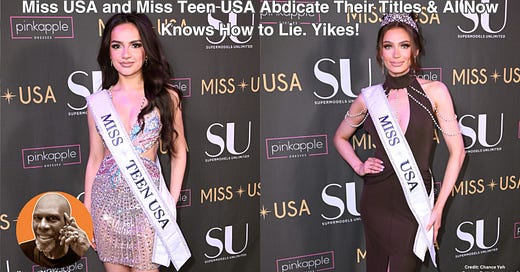Miss USA and Miss Teen USA Abdicate Their Titles & AI Now Knows How to Lie. Yikes!
Sen. Lindsey Graham Suggests Nuking Gaza, Gov. Kristi Noem Praises Her Dad's Anti-Seatbelt Stance, Trump Wants to Deport Protestors, Randy Travis Sings “Where That Came From”
What I’m Discussing Today:
Kareem’s Daily Quote: Sartre turned down the Nobel Prize. But he still has some serious wisdom for us that I won’t turn down.
The abdication of two beauty queens hints at ugly truth about Miss USA: Let’s not kid ourselves—beauty contests are harmful to women and society.
Is AI lying to me? Scientists warn of growing capacity for deception: AI is enormously beneficial to society—but we can’t pretend the dangers aren’t real, and potentially devastating.
Kareem’s Video Break: If I could do what they do, I’d have done better on Dancing with the Stars.
Sen. Lindsey Graham Suggests Nuking Gaza, Calls Hiroshima ‘the Right Decision’: This guy. Am I right?
Beyond Cricket: More Bonkers Stories From Kristi Noem’s Memoir: Turns out, her dad was just as irrational as she is. Reminder: she still wants to be veep.
Trump Says He’d Deport ‘Anti-American’ Protesters in Bizarre Rally Speech: Trump is the biggest enemy of free speech in the country. And he wants to be president?
Randy Travis Sings “Where That Came From”: A decade after a devastating stroke, Randy Travis is back—with the help of AI. Welcome back, Randy.
Kareem’s Daily Quote
Hell is other people.
Jean Paul Sartre, from his play No Exit
This is one of the most famous—and misunderstood—quotes of all time. Some have incorrectly interpreted Sartre to mean that hell is having to interact with other people all the time, having to deal with their rudeness, their hatred, their desperation, their inconsistencies, and their irrational emotions. Trapped in line at Starbucks. That’s not it.
It’s about the hell of worrying about what other people think of us to such an extent that it reshapes who we are. Our identity and how much we love ourselves become defined by the opinions of others—even when those opinions are never expressed or may not even be real. We project what they might be based on our own insecurities until we’ve resculpted ourselves to be what we think they want. That obsessive anxiety is hell.
We all look to be part of a group as a means of validation, comfort, and safety. The groups we choose to cozy up to are often the most instinctually basic: race, gender, nationality, religion, political party—even family. Many people are convinced that their group is the best because it’s the one they belong to, even though their membership is usually based on nothing more than coincidence of birth. Like cheering for the local sports team. To remain under the protection of that group, we have to then agree with them, which often means persecuting other groups that are different or disagree. Once we start doing that, we lose our Authentic Self—the person we want to be—in the herd mentality. We gladly stomp out the individual that we might have been, even wanted to be, in exchange for the comfort of belonging to the group. Then we spend the rest of our lives locked in that need to serve the group, replacing each original thought one by one like a human replacing organs with robot parts until they eventually become fully automated. That is hell.
Hell is other people when we become so dependent on their opinions of us that we spend our days desperately seeking their approval. We wear the “right” clothes, spout the “right” opinions, and make fun of outsiders. Ironically, it is often the people who most loudly proclaim they don’t care what people think that are the most enslaved to what other people think. That’s why they make the statement aloud in the first place: Because they care so much that we see them as independent thinkers. If they really didn’t care, they wouldn’t have said anything.
There has to be a balance in which we choose to belong to various groups—not because we were born into them or our parents brainwashed us into them and their love depends on your acceptance of those groups—but because we make a conscious decision after logically weighing the alternatives, to belong. Then we use the group to strengthen and support our beliefs rather than change who we are to better fit in.
In 1964, Jean-Paul Sartre won the Nobel Prize in Literature (worth $1.1 million in today’s dollars). He turned it down—the only person to ever do that. Why? He didn’t think writers should become institutions, meaning that once you accept the praise of the public, you then are in danger of ever-afterward chasing after more praise and avoiding their criticism. You would be in a hell of other people’s perceptions. I always admired that about him. I guess when the Nobel Prize in Literature is offered to me, I’ll have to decide what to do.





